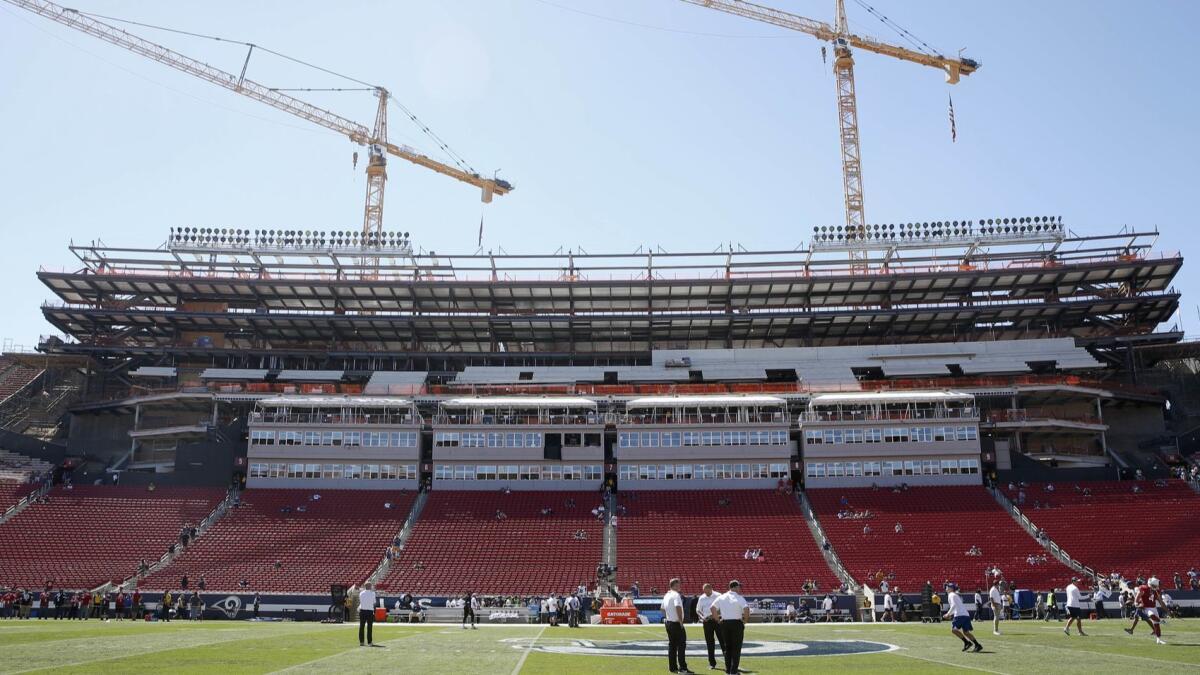Naming rights deal ignores the fact that the Coliseum is supposed to be a memorial

- Share via
United Airlines Memorial Coliseum.
I knew the day was coming but the reality didn’t sink in until I was racing up the stairs of Terminal 6 at Los Angeles International Airport last year and saw an artist’s rendering of a remodeled Coliseum with the new name plastered on it. It caught me off guard and forced me to stop and stare even though I was running late for my flight. The airline had recently announced it was paying $69 million over 16 years to rename the stadium once the $270-million renovation was completed this August.
There has been talk about a naming rights deal to help improve the Coliseum for years. The Coliseum Commission announced in 2008 it was seeking a corporate sponsor that would keep “Memorial Coliseum” in the name in order to finance much-needed renovations. In 2013, when USC took over operational control of the Coliseum and Sports Arena, they agreed to do the same to help pay for improvements to the stadium, which opened in 1923.
I knew there would be many more who would be equally startled when they saw a corporate sponsor’s name on the Coliseum for the first time this fall. That is if a name change ever actually happens.
United Airlines offered Friday to withdraw from the deal following criticism from Los Angeles County supervisor and Coliseum Commission president Janice Hahn, who wrote an Op-Ed piece for The Times that said replacing “Los Angeles” with a corporate sponsor “insults the memories of those the Coliseum was intended to honor.”
If you didn’t know the Coliseum was a war memorial, you’re not alone. Outside of “memorial” being a part of the official name, there’s no actual war memorial at the stadium. There’s a memorial court of honor within the peristyle arches comprised of 61 commemorative plaques, but they recognize athletes, coaches and contributors, not war heroes. Five of the plaques actually recognize the Coliseum Commission.
Sign up for our daily sports newsletter »
However the naming rights deals dispute is resolved, this issue should force everyone involved to do more to make the sure the stadium is an actual living memorial to all who served in the U.S. Armed Forces, which was the original intent. Perhaps they could build a statue to recognize those who have sacrificed their lives for this country at the Coliseum.
Maybe they could construct a monument in Exposition Park so that everyone going to a game or visiting the Natural History Museum of Los Angeles County, California Science Center, California African American Museum and the under-construction Lucas Museum of Narrative Art can learn about the brave men and women who fought for our freedom.
This should be about more than preserving the name of “Los Angeles” on a side of a building. It should be about honoring our war heroes with something far greater than a vague word no one actually knows the meaning behind and no one actually says when talking about the Coliseum.
The Los Angeles Memorial Coliseum and the Los Angeles Memorial Sports Arena were dedicated as “a memorial to U.S. Armed Forces Veterans serving in all military conflicts” but most people just say and write “Coliseum” or “Sports Arena” when talking about the venues. The Sports Arena, which much like the Coliseum had no actual war memorial, was torn down in 2016 and replaced by Banc of California Stadium, the home of LAFC.
Long before arenas and stadiums included naming rights deals in their financing plans, it was common to recognize the thousands that sacrificed their lives when naming a venue. For example, the Buffalo Bills called War Memorial Stadium home and the Baltimore Colts and Baltimore Orioles played at Memorial Stadium. But the Rams will be last major professional sports team to call a venue with “memorial” in its name home this upcoming season. No other permanent venue used by the NFL, MLB, NBA, NHL, MLS or WNBA will have “memorial” in its name after next year.
No matter what two words precede Memorial Coliseum this fall and moving forward, everyone involved should do something greater to honor our war heroes and truly make the Coliseum the living memorial it was intended to be.
::
One of the keys to an effective naming rights deal is getting it on the building before it opens. It doesn’t make much sense slapping it on a building like the Coliseum, Rose Bowl or Dodger Stadium decades later. No one is going to call it anything else at this point. It should probably also make sense for the company. For example, I’m not sure I’d want to put an airline’s name next to “memorial.”
Staples Center has one of the more unique naming rights deals. Ten years ago, on the 10th anniversary of the arena’s opening, AEG announced the first-ever lifetime naming rights deal. As long as the arena is standing, it will be called Staples Center.
The name has become more synonymous with the arena than the office supply store. Tell someone you’re going to Staples in L.A. and chances are they’re going ask you what game you’re going to see.
::
The Los Angeles Stadium at Hollywood Park, which will be the home of the Rams and Chargers next year, will likely get the largest naming rights deal ever. The largest so far came in 2017 when Scotiabank agreed to a 20-year, $639-million deal to rename Toronto’s Air Canada Centre.
It’s not hard to imagine a stadium that will be the home of two NFL teams, events for the 2028 Summer Olympics, multiple Super Bowls and college football national championship games, not to mention being directly under the flight path of planes coming into Los Angeles from around the world, getting more than that.
::
Whenever the new stadium gets its name, some of the credit should go to their neighbors across the street. The first big naming rights deal was struck in 1988 when Great Western Bank put its name and colors on the Forum, which became known as the Great Western Forum. Late Lakers owner Jerry Buss said at the time the deal was made to improve the arena.
“For us, it worked out great,” current Lakers owner Jeanie Buss once said. “It was the Great Western Forum. It fit better than it probably would have if it were the Clorox Forum.”
More to Read
Go beyond the scoreboard
Get the latest on L.A.'s teams in the daily Sports Report newsletter.
You may occasionally receive promotional content from the Los Angeles Times.







